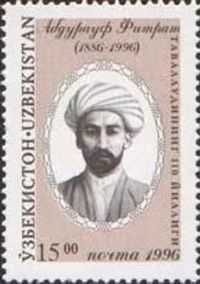Abdulrauf Fitrat
| Abdulrauf Fitrat | |
|---|---|
|
A commemorative Uzbek stamp made in honor of Abdulrauf Fitrat's 100th birthday | |
| Born |
1886 Bukhara |
| Died |
4 October 1938 Tashkent |
| Occupation | Reacher, theorist, politician, educator, writer, and scholar |
| Literary movement | Jadidism |
Abdulrauf Fitrat (sometimes spelled Abdurrauf Fitrat or Abdurauf Fitrat) (Uzbek: Abdurauf Fitrat, Абдурауф Фитрат) (1886–1938) was a prominent modernist figure in Russian Central Asia. He was a jadid reformer and made major contributions to modern Uzbek literature.[1] He wrote both in Persian and late Chagatay.[2]
Fitrat was born in Bukhara. In 1909, he went to Istanbul to study literature and history.[3] He returned in 1914, and became involved in cultural activities. Fitrat was involved with the Yeni Bukharlylar or Young Bukharians, a revolutionary group modeled on the Young Turks movement which was active with the Bolsheviks during the Russian Revolution. In 1920, he became chief minister of economics and minister of education in the Bukharan People's Soviet Republic, but was ousted in 1923. He then worked as a scholar of Central Asian Turkic culture (a practice considered criminal in the Soviet Union), before being arrested in 1937 as part of the Great Purge. He was executed in 1938.
References
- ↑ "Uzbek literature". Encyclopædia Britannica Online. Encyclopædia Britannica. Retrieved 5 September 2014.
- ↑ "Feṭrat, ʿAbd-al-Raʾūf Boḵārī". Encyclopædia Iranica. Retrieved 5 September 2014.
- ↑ "Abdurrauf Fitrat". EdebiyatFakultesi.com (in Turkish). Retrieved 5 September 2014.
|
